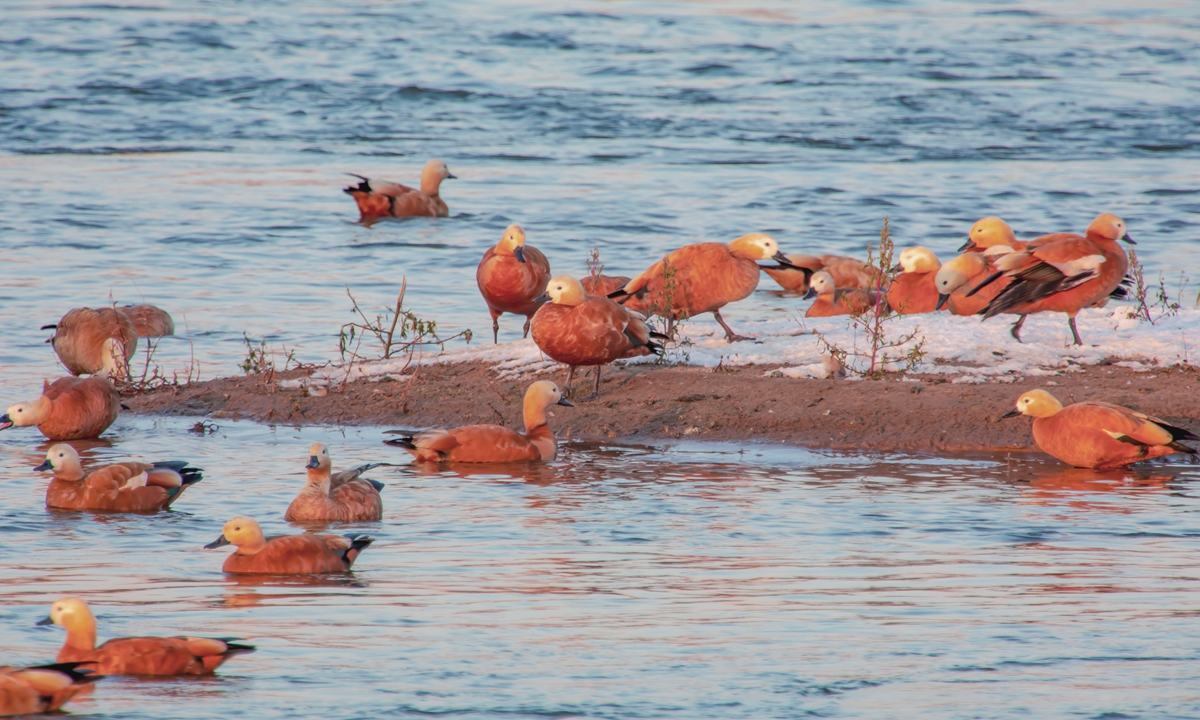
Wild ducks in Changbai Island, Northeast China's Jilin Province Photos: IC

Ren Jianguo holds a telescope to watch birds at Changbai Island
In December, the intense cold in Northeast China's Jilin Province turns dripping water into ice within seconds in this border area. Yet, 63-year-old Ren Jianguo gets up early before 5 am every day to sprinkle corn on the river banks to make sure thousands of migratory birds have enough energy to make it through the winter.
"Every day at 6 o'clock in the morning these birds leave their nests for food. We spread 150 kilograms of corn kernels on the riverbanks before the birds go home," Ren told the Global Times.
Warm and welcomingRen lives in Jilin, Jilin Province. Built on the banks of the Songhuajiang River, one of the primary rivers of China, the city is also known as the "river city in north." Over the past 26 years, Ren has been one of many volunteers protecting migratory birds on Changbai Island in the town center, where local residents label him as "Uncle Bird."
Winter is the busiest time for Uncle Bird as it is the season when massive amounts of migratory birds fly to Changbai Island to avoid the biting cold days in Siberia, Russia.
"Of course he is quite famous among us… everyone appreciates his work," a staff member at the local Water Conservancy Bureau told the Global Times.
On the upper reaches of the Jilin section of the Songhuajiang River is China's largest artificial lake, formed by the 90-meter-high Fengman Dam. The temperature of the water from the hydroelectric dam, stays at around 4-10 C all year round, making the downstream section a river that never freezes.
This allows Changbai Island to welcome countless south-migrating water birds, especially wild ducks from Siberia such as mallard ducks and ruddy shelducks.
"As long as they choose to stay in this city, there should be people to take care of them. When it comes to the harsh winter and it becomes difficult to find food, I call for donations or sometimes pay for the food myself to guarantee their survival during the winter," Ren said.
Jilin, which is part of the migratory passage of birds in East Asia, is one of the few warm wetlands in northern China suitable for migratory birds to rest. However, due to high pollution levels in the river decades ago, Ren said that when he settled in the city in the 1990s, only hundreds of migratory birds would come every winter, compared with the more than 8,000 birds today.
To improve the environment in this urban wetland, the Chinese government has invested an estimated 26.6 billion yuan (3.8 billion) for water pollution control and prevention along the Songhuajiang River since 2006.
In Jilin, local government put up protective barriers and established viewing areas along the river and set limits on factory production and wastewater discharges to improve water quality.
For Ren himself, a shed near the riverbank has almost become his "second home," a place from which he can patrol along the banks, observe the dynamics of the birds, educate the public about bird conservation and, after a long day of work, light a fire and enjoy a warm meal.
When he receives a report of an injured bird, he takes his boat or his electric scooter to provide help.
"I simply want this to be a warm and welcoming place for birds when they choose to stay here for a temporary rest," he said.
Adapting to changeThree of the eight major migration routes in the world pass through China, bringing birds from the north passing through on their way to Australia, South Asia and Africa.
Yet studies have shown that rapid global climate change, coupled with changes in the natural environment have greatly affected the time and place of migrations, and even the breeding time of migratory birds who are extremely sensitive toward their surroundings.
"To adapt to global climate change, migratory birds have changed their habits. While many bird species are actively adapting to the changing climate, they are struggling to keep up with the pace of climate change because our Earth is changing too quickly for them," said Zhao Xumao, a researcher at the Lanzhou University Ecology Innovation Institute.
A report from the China Meteorological Administration in April 2021 shows that climate change has caused many migratory birds to change their habit of just passing through China as they head to the Pacific Ocean or South Asia for the winter, instead more and more migratory birds are choosing to spend winter within China's wetlands.
To provide a better living environment for these birds and help wildlife diversity in China recover, the country has stepped up protection of wetlands and nature reserves by introducing new regulations and high technology.
On June 1, 2022, the Chinese government introduced the wetlands protection law, becoming the second country in the world to implement such legal protections.
As of 2022, the country has established 11,800 natural reserves to meet the requirements of the UN's Convention on Biological Diversity.
"There's no need to describe the changes in the past 30 years as we can see with our own eyes that the entire environment is getting better and better. Thirty years ago, it was impossible to see more than 8,000 birds together in the urban area. However, I think there is still a long way to go to raise public awareness," Ren told the Global Times.





